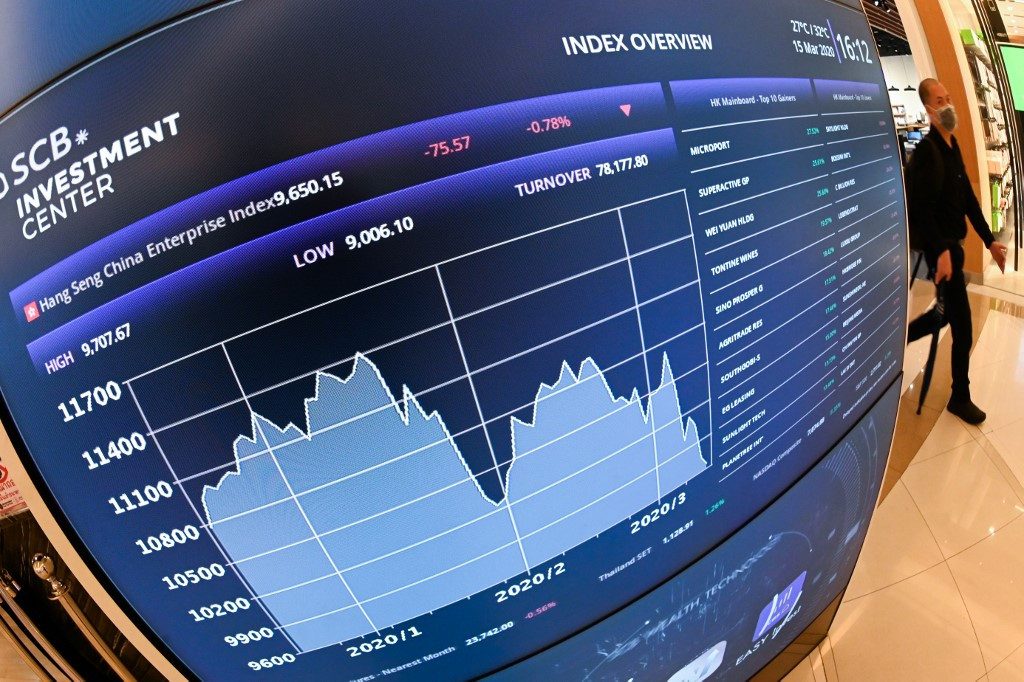Popular Reads
Top Results
Can't find what you're looking for?
View all search resultsPopular Reads
Top Results
Can't find what you're looking for?
View all search resultsAsian stocks hold gains, dollar strong on Fed official comments
This week the MSCI Asian regional benchmark has walked back most of the ground lost a week earlier, when a series of Chinese regulatory crackdowns in sectors from property to education squeezed Chinese stocks and overshadowed the region as a whole.
Change text size
Gift Premium Articles
to Anyone
A
sian shares held on to recent gains in morning trading on Thursday, despite hawkish remarks from a senior official at the United States Federal Reserve, that boosted the dollar while weighing on risk appetite, and uncertainty about Chinese policy.
MSCI's broadest index of Asia-Pacific shares outside Japan rose 0.22 percent, and Japan's Nikkei climbed 0.32 percent.
Australia gained 0.18 percent, Chinese blue chips fell 0.28 percent and Hong Kong advanced 0.45 percent.
This week the MSCI Asian regional benchmark has walked back most of the ground lost a week earlier, when a series of Chinese regulatory crackdowns in sectors from property to education squeezed Chinese stocks and overshadowed the region as a whole.
Chinese equities have been calmer this week, barring sharp swings in tech giant Tencent after state media criticised the gaming industry.
Read also: Asian shares try to stabilize, China growth a worry
"In the short term, the further rebound may continue but uncertainties over policy control will drive long-term investors away from Chinese technology names," said Edison Pun, senior market analyst at Saxo Markets.
Pun also pointed to remarks about the electronic cigarette business in state media Wednesday, which he said may also bring pressure to related stocks.
US stocks closed mostly lower on Wednesday, with the S&P 500 receding 0.46 percent from a record high. The blue-chip Dow slid 0.92 percent, though the tech heavy Nasdaq eked out small gains with investors there attaching greater weight to positive data from the services sector than to negative jobs figures.
US stock futures - the S&P 500 e-minis - edged up 0.2 percent in Asian trading.
Markets are looking at the "mixed signals from the data, and trying to assess what the Fed will do," said Kyle Rodda, an analyst at IG markets. Rodda said the latest moves were driven by an overnight speech from Fed Vice Chair Richard Clarida which took a more hawkish tone.
Clarida, a major architect of the Fed's new policy strategy, said he felt the conditions for raising interest rates could be met by the end of 2022.
Those remarks helped US yields and the dollar.
The benchmark 10-year yield was last at 1.199 percent up from a US close of 1.184 percent, having touched 1.127 percent - its lowest level since February - earlier in the day.
This helped the dollar, which bought 109.63 yen, compared with a low of 108.71 on Wednesday.
The firmer dollar in turn weighed a little on gold, with the spot price falling 0.1percent.
US crude rose 0.37 percent to US$68.4 a barrel while Brent crude climbed to $70.61 per barrel, regaining a little ground after three days in a row of declines.
Read also: Rupiah on the slide since Fed meeting
Analysts at CBA said Wednesday's fall was a result of "a big rise in US crude oil inventories (which) crystallised the market's conceptual angst about the Delta-variant COVID dragging on fuel demand."
Ether, the world's second-largest cryptocurrency, dropped 1.75 percent having gained 8.7 percent a day earlier ahead of a technical adjustment to its underlying ethereum blockchain, which should happen later today.
Bitcoin fell 1.3 percent, resting in the vicinity of $40,000 where it has been for the last week.










